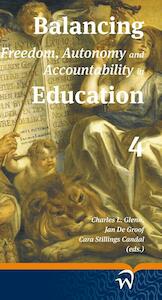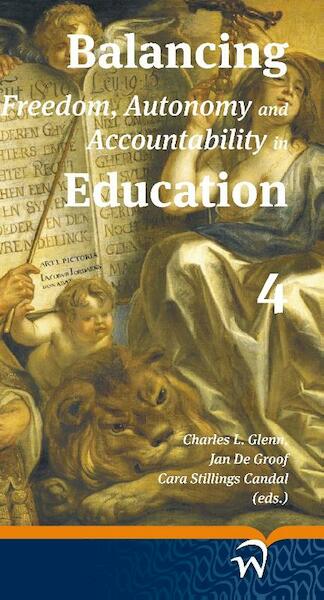| Prijs | € 80,00 |
Uitverkocht
Hardback | Januari 2012 |
Beoordeel dit boek als eerste!Beschrijving
Specificaties
- Uitgever
- Wolf Legal Publishers
- ISBN
- 9789058507761
- Bindwijze
- Hardback
- Publicatiedatum
- Januari 2012
- Categorie
- Wetenschappelijk
- Taal
- Engelstalig
- Aantal Pagina's
- 298
Beschrijving
This volume is a continuation of volumes 1-3 of Balancing Freedom, Autonomy, and Accountability in Education, published by Wolf Legal Publishers in 2005.
Educational freedom is important because parents have a fundamental right, recognized in national and international law, to guide the development of their own children and therefore to choose a school in which they have full confidence. For many parents, this will mean a school that shares their own views about what is most important in life, their religious or philosophical worldview. To deny that choice, or to make it impossibly difficult for parents of modest means, is unjust and unworthy of a free society.
School autonomy is important because it is the essential precondition for the creation of schools with a clearly-focused mission, schools in which staff and parents and the controlling board or other authority share the same understanding of how best to educate. We are long past the days when educators could promise that they had a single formula for providing the best possible education to every child or youth. We know that different schools work best for different pupils, and that teachers find professional satisfaction (and enhanced professional status) in schools where they share a common vision with their colleagues.
Accountability for common standards is important because today's pupils will be the parents, adult citizens, and productive workers of tomorrow. Society has a strong interest in ensuring that they are well prepared for those roles, and that they share an understanding of the virtues required by a free society. Society also has an obligation to ensure that no child or youth is harmed by neglectful or abusive parents or schools. It would be unjust to simply let the choices of parents and the enthusiasms of educators result in some pupils (typically those most disadvantaged by economic circumstances if not also by ethnic minority status) receiving an ineffective education.
In the 2005 edition, volume 1 consisted of general essays by the editors, Charles Glenn of Boston University and Jan De Groof of the College of Europe and Tilburg University, providing historical and legal background and comparative perspective on these issues, while volumes 2 and 3 included chapters on forty national education systems, describing the laws and policies under which both public and nonpublic schools operate in each. These country profiles are being updated by many experts and a new edition will be published in 2012.
Volume 4 is being issued before the revised volumes 1-3 because it includes 16 countries not in the 2005 edition together with an updated profile of Russia. Volume 4 also includes an important essay by Martin R. West of Harvard University and Ludger Woessmann of the University of Munich on what international comparative data tell us about the effects of school choice, autonomy, and accountability on student achievement and equity.
Schrijf een recensie
Specificaties
- Uitgever
- Wolf Legal Publishers
- ISBN
- 9789058507761
- Bindwijze
- Hardback
- Publicatiedatum
- Januari 2012
- Categorie
- Wetenschappelijk
- Taal
- Engelstalig
- Aantal Pagina's
- 298











